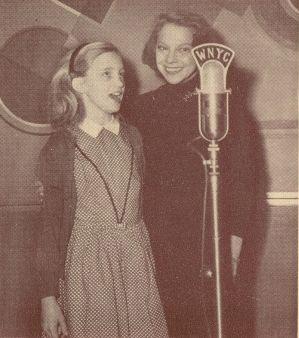 NYPR Archives & Preservation
NYPR Archives & Preservation
Radio for Children: Ireene Wicker, The Singing Lady

Our five-year old at home loves The Singing Lady, WNYC's program of tales and music for children from before her parents were born.
Kids today spend too much time on their computers, PDAs or video-game consoles — and it is outrageous what they are exposed to! The "kids today" of yore spent too much time watching television, reading comics, reading pulp fiction or, in Cervantes' times, romance novels (when will we get the Quixote of apps?). But radio? Well, gather round, children, and listen to the beacon of peace that is Ireene Wicker's "Singing Lady."
Ireene Wicker was "one of the very earliest children's radio storytellers." She started on NBC in January 1932 already having coined the moniker The Singing Lady. It is reported that she added an extra 'e' to her name when a numerologist suggested it would bring her good luck.
WNYC's "The Singing Lady" had minimal production values and staff: just Ms. Wicker and the young, talented pianist Samuel Sanders. But that did not stop it from receiving a Peabody Award in 1960. She actually did just a little singing beyond the very catchy theme song, although her talent for drama and for recreating a great variety of character voices shines through.
Lest you think this 1960s program is a reflection of more genteel times, most children's radio programs have always been about adventures and violence — so much so that already by 1937 poet Berton Braley had rewritten the Longfellow poem "The Children's Hour" to start thus:
Between the dark and the daylight,
There comes from each radio tower
A series of gentle broadcasts
That are known as the Children's Hour.
And the girls and boys are gathered
To listen with bated breath
To educational programs
Of murder and Sudden Death.
By 1935 an article in National Education Association Journal reported that radio listening had created "a nightmare in the home," converting children into nervous wrecks oblivious to everything else; Azriel Eisenberg's 1936 study of 3,000 New York children age 10 to 13 found that more than a third of them had their sleep affected by the radio programs they listened to.
Although far more research has since been conducted on television programming for children, the argument about radio raged on for decades: some studies showed negative effects on children's sleep patterns or other behaviors, while content producers found their programs not pernicious — but effective in selling their advertisers' products.
Perhaps the dire warnings about quantity and quality of media that analysts have shouted for decades have footing: after all, we live in an increasingly sedentary, overweight and violent society. If so, we invite you to counteract all your crazy radio listening with Ireene Wicker's gentle "The Singing Lady."
You can listen to more of Ireene Wicker's WNYC shows at: The Singing Lady